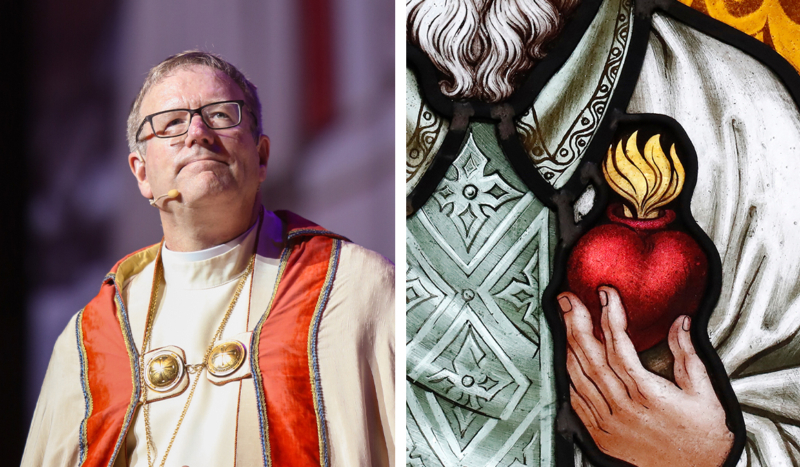
Bishop Barron by Roman Catholic Archdiocese of Boston / Flickr (Left), Adobe Stock (Right)
In this week’s episode of the “Word on Fire Show” podcast, Bishop Robert Barron responded to criticism from both progressives and traditionalists, explaining that receiving blowback from both extremes is “an occupational hazard of anyone who articulates the Church’s social teaching.”
Critics on both sides of the ideological divide often attempt to box the bishop into a category, he explained in the May 19 episode. Some accuse him of being too sympathetic to progressive social causes, while others claim he doesn’t go far enough in opposing cultural liberalism.
Bishop Barron explained that he sees these criticisms as a sign of his fidelity to Church teaching: “When extremes on both sides are finding a problem, then I’m likely in the right place.”
He added later, “As I’ve said many times, my lodestar is Catholic social teaching. Sometimes the left agrees with it, sometimes the right agrees with it. Sometimes the left is opposed to it, sometimes the right’s opposed to it. I don’t care about left and right.”
Bishop Barron founded Word on Fire in 2000 at the prompting of Cardinal Francis George, who asked then-Father Barron to “jump-start evangelization” after Pope John Paul II had challenged the cardinal to evangelize the culture. Fr. Barron began recording his homilies to air on a local radio show and was later ordained to the episcopate as an auxiliary bishop of Los Angeles on September 8, 2015.
The bishop founded Word on Fire Institute in 2018, expanding efforts to evangelize the culture through its global media apostolate. The institute is a community of more than 25,000 Catholics that offers courses, films, seminars, and books for its members.
Word on Fire often receives complaints that it emphasizes aesthetics — architecture, art, literature — while the world suffers from injustice and poverty, the bishop stated. Addressing this complaint, he defended beauty as both evangelically effective and spiritually necessary.
He explained that in a culture of moral relativism, where people are skeptical of absolute statements, beauty is less threatening than truth, as inviting somebody to witness something beautiful is less threatening than telling them what to believe.
Next, Bishop Barron addressed those who critique his appreciation for the theologian and priest Hans Urs von Balthasar, whom many accuse of supporting the heresy of universalism, the idea that all people will be saved. Critics accuse Bishop Barron of holding the same heretical position, he explained in the video.
“Neither Balthasar nor I accept a doctrine of universal salvation. That’s a heresy,” Bishop Barron stated, explaining that the Church condemned the idea of a necessarily empty Hell very early on.
“I would say, we may hope, indeed, we should hope, that all people might be saved,” he clarified. “That’s not saying they all will be saved. It’s not a prediction. It’s a spiritual attitude. And that hope is born of love.”
He quoted paragraph 1821 of the Catechism of the Catholic Church, which states that “In hope, the Church prays for ‘all men to be saved.’”
The bishop also addressed criticisms for attending political events, such as President Donald Trump’s joint address to Congress, and for not speaking more forcefully on certain policy issues. He stated that bishops are to preach the Church’s moral principles, not endorse politicians.
Bishop Barron explained that a West Virginia congressman invited him to Trump’s joint address to Congress, and added, “Look, I’m an American citizen. I find that fascinating, interesting. I didn’t give a speech. I didn’t endorse anybody. I didn’t hold forth on any political matter. I sat in a chair in the gallery and listened.”
Bishop Barron explained when it is his duty to speak out about political, moral, and policy issues. He distinguished between issues of intrinsic moral evil, such as abortion and euthanasia, and complex policy matters, such as immigration, explaining that while it was necessary for him to speak out against intrinsic evils, more complex matters may be left to the prudence of politicians.
“Certain things are objectively, intrinsically evil,” he said. “Others are a matter of political prudence.”
He added later on, “A good example would be the immigration debate, that all people should be treated with love and respect. Yes, all people are sources of infinite dignity, of course. Now, how do you manage the border of a country? How do you particularly manage these complex issues? Well, I’m not an expert in that. I’m not proposing legislation. That’s not my job.”
Finally, Bishop Barron addressed accusations of his position on the Second Vatican Council – which range from claims that he rejects the Council’s spirit to claims that he embraces it too enthusiastically.
“I stand with Vatican II as interpreted by the great post-conciliar popes, from Paul VI to Francis,” Bishop Barron said. “And I stand with the Catechism of 1993.”
He criticized both radical progressivism and radical traditionalism for distorting the Council’s true vision.
“If you’re saying, ‘I can pick and choose which ecumenical councils I like, which parts of which ecumenical councils I like’, you become a Protestant,” he said.
Bishop Barron concluded by sharing advice for all those working to share the Gospel in a public forum.
“You’ve got to have thick skin, and you’ve got to go out there with a certain evangelical panache and not worry about it,” the bishop stated. “If you start looking at the critics all the time, worry more about it. So it’s part of public life. If you’re declaring the faith in a public forum, expect it. But don’t get preoccupied.”

